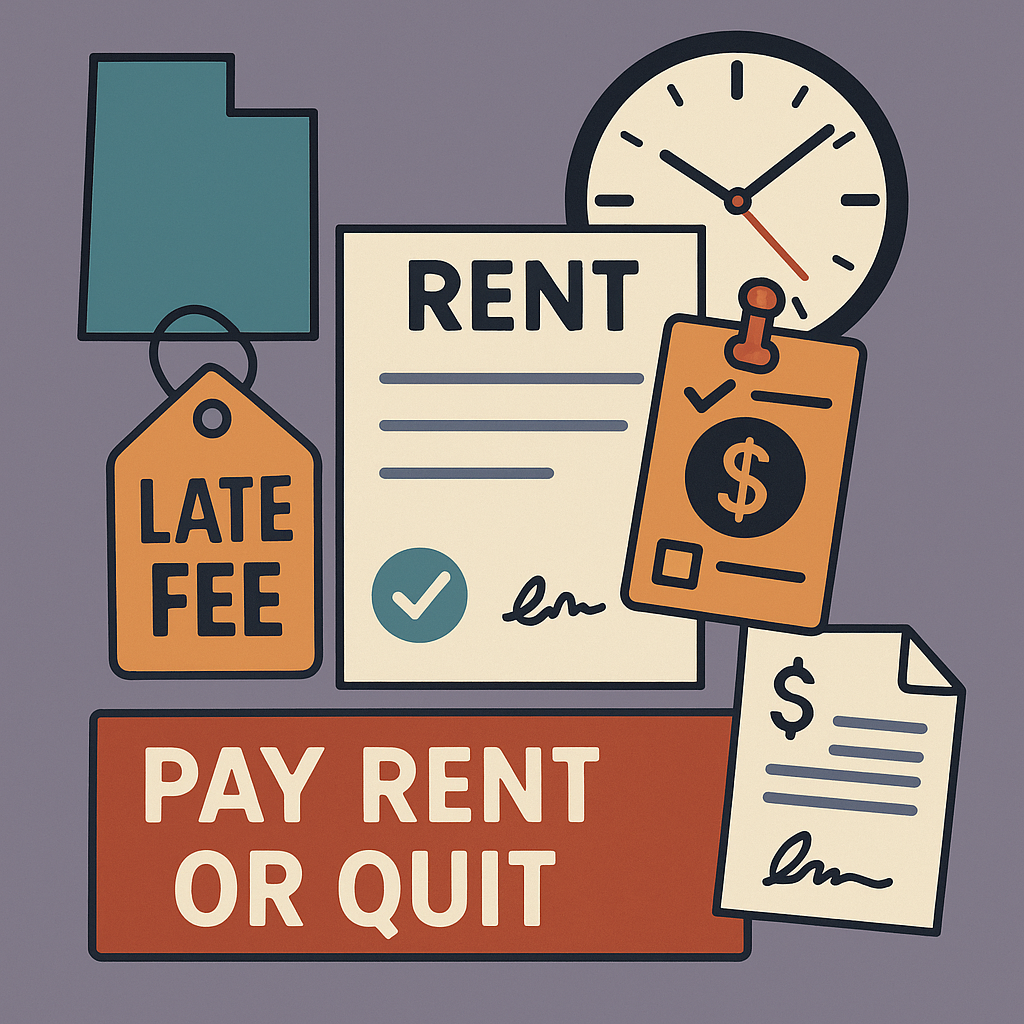What are Utah rules on late fees, grace periods, and rent notices?
Plain-English guide to due dates, late fees, grace periods, and pay-or-quit notices in Utah rentals
In Utah, rent deadlines and late fees can get confusing fast, especially when every lease handles them differently. This guide breaks down how Utah law treats late rent, what landlords can charge, and what notice must be given before eviction steps begin so both renters and landlords can avoid costly mistakes.
Late Fee Basics & Good Practice
Utah allows late fees if they’re reasonable and clearly stated in the signed lease. There’s no statewide cap, but courts frown on excessive or punitive fees that don’t reflect real administrative costs.
If the lease doesn’t specify a late fee, one can’t be added later without the tenant’s written consent. Many Utah leases use either a flat amount (for example, $50) or a small percentage of monthly rent (for example, 5%). Confirm terms in writing and keep receipts or digital proof of payment.
Grace Periods & Due Dates
Utah law doesn’t require a grace period. Rent can be considered late the day after it’s due unless the lease gives extra days. As a best practice, many landlords include a three- to five-day grace window to maintain good relationships and reduce disputes.
Pay-or-Quit Notice Timing
If rent goes unpaid, landlords must serve a written “pay or quit” notice that gives a short window — usually three business days to pay the overdue amount or move out. The notice must state the amount owed and the deadline. If the tenant pays in full within the window, the eviction cannot continue.
Notices may be delivered in person, posted at the property, or sent by certified mail. Utah law requires proper service and content for the notice (see Utah Code §78B-6-802 on service requirements). Invalid notices are a common reason eviction filings get dismissed.
Documentation & Receipts
Documentation protects both sides. Landlords should maintain a rent ledger that shows all payments, fees, and balances. Tenants should use traceable payment methods and ask for receipts.
When disputes arise, Utah courts often request detailed rent histories. A clean paper trail can be the difference between a quick resolution and a costly fight.
Curing vs. Termination
Tenants generally have the right to cure a rent default by paying within the notice period. After that period ends, the landlord can file in court. Once a case is filed, payment alone might not stop the eviction unless the landlord agrees to dismiss so timing matters.
For landlords, following procedure precisely is essential. Serving the wrong notice or rejecting a valid tender of payment can lead to wrongful-eviction claims and penalties.
Avoiding Waiver & Common Errors
Consistently accepting late rent without enforcing late fees or notices can create a waiver pattern. A judge may decide you waived strict enforcement. Be consistent and document any exceptions in writing.
- Charging late fees that aren’t in the lease
- Serving notices with missing details or improper service
- Confusing nonpayment with other lease violations
- Poor record-keeping for payments and communications
- Filing for eviction before serving a valid written notice
Video & Social Learning Hub
YouTube: Utah Rent Rules
Need Help Applying This to Your Situation?
Understanding Utah’s late fee and notice rules can save you time, money, and stress. Whether you’re a tenant staying compliant or a landlord protecting your property, clear policies and clean records go a long way.
Talk to a Utah AttorneyExplore more guides on Landlord-Tenant Law at Utah Law Explained, learn about our mission on the About Us page, or connect with trusted counsel like Gibb Law Firm.
